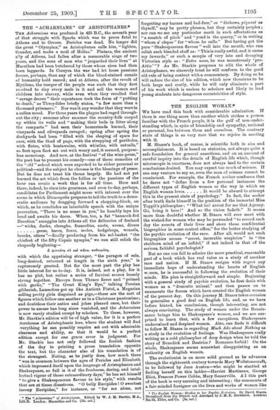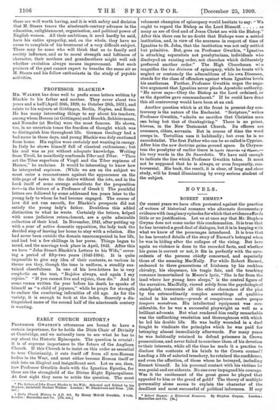THE ENGLISH WOMAN.* WE have read this book with considerable
admiration. If there is one thing more than another which strikes a peraon familiar with the French people, it is the gulf of non-under- standing which, in spite of friendship and sympathy, national or personal, lies between them and ourselves. The contrary state of things is so very rare that we rejoice in meeting with it.
Staars's book, of course, is scientific both in aim and
accomplishment. It is based on statistics, not always quite a safe foundation for general assertions, and on an amount of careful inquiry into the details of English life which, though microscopic in exactness, does not always lead to the certain conclusions desired. You may expect too much of science. If one may venture to say so, even the man of science cannot be omniscient. For example, the French author confesses that he dares not " define from a few personal instances the different types of English women or the way in which an
English woman loves It would be absurd to attempt this in the present state of psychology." In fact, the seeker after truth finds himself in the position of the immortal Miss Toppit's philosopher: "'What ho! arrest for me that Agency. Go, bring it here !' And so the vision fadeth." It seems more than doubtful whether M. Steers will ever meet with the wished-for women who may be persuaded " to record each day the secrets of their lives and store these confidential biographies in some central office," for the better studying of the psychic evolution of the race. After all, would not such biographies arouse "secret, incurable suspicion" in "the stubborn mind of an infidel," if not indeed in that of the serious, faithful psychologist P But no one can fail to admire the more practical, reasonable
part of a book which has real value as a study of another race and nation. If M. Staars resigns with regret any immediate hope of understanding the hearts of English women, he is successful in following the evolution of their minds. His plan is straightforward and simple. Beginning with a general study of psychic evolution, he first deals with woman as a " domestic animal," and then passes on to enumerate the forces which have created the English woman of the present day. On this journey M. Steers takes occasion to generalise a good deal on English life, and, as we have before hinted, his conclusions, though interesting, are not always convincing. The study of women under the Renais- sance brings him to Shakespeare's women, and we are sur- prised to learn that, with a few exceptions, Shakespeare undervalued and despised women. Also, one finds it difficult to follow M. Staars in regarding Much Ado about Nothing as a study in the evolution of feelings. Was Shakespeare really writing as a cold philosopher of deep design when he told the story of Benedick and Beatrice ? Romance forbid! On the whole, Shakespeare seems somewhat disappointing as an authority on English women.
The evolutionist is on more solid ground as he advances
through the eighteenth century towards Mary Wollstonecraft, to be followed by Jane Austen—who might be startled at finding herself on this ladder—Harriet Martineau, George Eliot, Frances Power Oobbe, Mary Somerville. Al this part of the book is very amusing and interesting ; the comments of a fair-minded foreigner on the lives and works of women like
• The English Woman: Studies en her Psychic Brolution. By David Steam Translated from the French and Abridged by J. M. E. Brownlow. London, 'Smith Elder, and Co. [Os. net.1 these are well worth having, and it is with safety and decision that M. Staars traces the nineteenth-century advance in the education, enlightenment, organisation, and political power of English women. All their ambitions, it need hardly be said, have his entire sympathy, and, on the whole, they have no cause to complain of his treatment of a very difficult subject. There may be some who will think that as to family and society influence, and as to moral strength and loftiness of character, their mothers and grandmothers might well ask whether evolution always means improvement. But such praisers of the past cannot expect to breathe the same air as M. Staars and his fellow enthusiasts in the study of psychic activities.



































 Previous page
Previous page